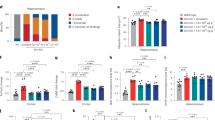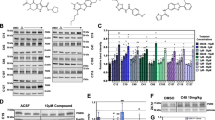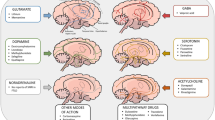Abstract
Frontotemporal lobar degeneration (FTLD) is a progressive neurodegenerative disease with an age at onset generally below 65 years. Mutations in progranulin (GRN) have been reported to be able to cause FTLD through haploinsufficiency. We have sequenced GRN in 121 patients with FTLD and detected six different mutations in eight patients: p.Gly35Glufs*19, p.Asn118Phefs*4, p.Val200Glyfs*18, p.Tyr294*, p.Cys404* and p.Cys416Leufs*30. Serum was available for five of the mutations, where the serum-GRN levels were found to be >50% reduced compared with FTLD patients without GRN mutations. Moreover, the p.Cys416Leufs*30 mutation segregated in an affected family with different dementia diagnoses. The mutation frequency of GRN mutation was 6.6% in our FTLD cohort.
Similar content being viewed by others
Log in or create a free account to read this content
Gain free access to this article, as well as selected content from this journal and more on nature.com
or
References
Mackenzie IR, Neumann M, Bigio EH et al: Nomenclature and nosology for neuropathologic subtypes of frontotemporal lobar degeneration: an update. Acta Neuropathol 2010; 119: 1–4.
McKhann GM, Albert MS, Grossman M, Miller B, Dickson D, Trojanowski JQ : Clinical and pathological diagnosis of frontotemporal dementia: report of the Work Group on Frontotemporal Dementia and Pick’s Disease. Arch Neurol 2001; 58: 1803–1809.
Neary D, Snowden JS, Gustafson L et al: Frontotemporal lobar degeneration: a consensus on clinical diagnostic criteria. Neurology 1998; 51: 1546–1554.
Lomen-Hoerth C, Anderson T, Miller B : The overlap of amyotrophic lateral sclerosis and frontotemporal dementia. Neurology 2002; 59: 1077–1079.
Hutton M, Lendon CL, Rizzu P et al: Association of missense and 5′-splice-site mutations in tau with the inherited dementia FTDP-17. Nature 1998; 393: 702–705.
Baker M, Mackenzie IR, Pickering-Brown SM et al: Mutations in progranulin cause tau-negative frontotemporal dementia linked to chromosome 17. Nature 2006; 442: 916–919.
Cruts M, Gijselinck I, van der Zee J et al: Null mutations in progranulin cause ubiquitin-positive frontotemporal dementia linked to chromosome 17q21. Nature 2006; 442: 920–924.
Dejesus-Hernandez M, Mackenzie IR, Boeve BF et al: Expanded GGGGCC hexanucleotide repeat in noncoding region of C9ORF72 causes chromosome 9p-Linked FTD and ALS. Neuron 2011; 72: 245–256.
Renton AE, Majounie E, Waite A et al: A hexanucleotide repeat expansion in C9ORF72 is the cause of chromosome 9p21-Linked ALS-FTD. Neuron 2011; 72: 257–268.
Rohrer JD, Guerreiro R, Vandrovcova J et al: The heritability and genetics of frontotemporal lobar degeneration. Neurology 2009; 73: 1451–1456.
Seelaar H, Rohrer JD, Pijnenburg YA, Fox NC, van Swieten JC : Clinical, genetic and pathological heterogeneity of frontotemporal dementia: a review. J Neurol Neurosurg Psychiatry 2011; 82: 476–486.
Gijselinck I, van der Zee J, Engelborghs S et al: Progranulin locus deletion in frontotemporal dementia. Hum Mutat 2008; 29: 53–58.
Rovelet-Lecrux A, Deramecourt V, Legallic S et al: Deletion of the progranulin gene in patients with frontotemporal lobar degeneration or Parkinson disease. Neurobiol Dis 2008; 31: 41–45.
Finch N, Baker M, Crook R et al: Plasma progranulin levels predict progranulin mutation status in frontotemporal dementia patients and asymptomatic family members. Brain 2009; 132: 583–591.
Ghidoni R, Benussi L, Glionna M, Franzoni M, Binetti G : Low plasma progranulin levels predict progranulin mutations in frontotemporal lobar degeneration. Neurology 2008; 71: 1235–1239.
Sleegers K, Brouwers N, Van Damme P et al: Serum biomarker for progranulin-associated frontotemporal lobar degeneration. Ann Neurol 2009; 65: 603–609.
Beck J, Rohrer JD, Campbell T et al: A distinct clinical, neuropsychological and radiological phenotype is associated with progranulin gene mutations in a large UK series. Brain 2008; 131: 706–720.
Gass J, Cannon A, Mackenzie IR et al: Mutations in progranulin are a major cause of ubiquitin-positive frontotemporal lobar degeneration. Hum Mol Genet 2006; 15: 2988–3001.
Le Ber I, Camuzat A, Hannequin D et al: Phenotype variability in progranulin mutation carriers: a clinical, neuropsychological, imaging and genetic study. Brain 2008; 131: 732–746.
Masellis M, Momeni P, Meschino W et al: Novel splicing mutation in the progranulin gene causing familial corticobasal syndrome. Brain 2006; 129: 3115–3123.
Sleegers K, Brouwers N, Maurer-Stroh S et al: Progranulin genetic variability contributes to amyotrophic lateral sclerosis. Neurology 2008; 71: 253–259.
Schymick JC, Yang Y, Andersen PM et al: Progranulin mutations and amyotrophic lateral sclerosis or amyotrophic lateral sclerosis-frontotemporal dementia phenotypes. J Neurol Neurosurg Psychiatry 2007; 78: 754–756.
Chiang HH, Rosvall L, Brohede J et al: Progranulin mutation causes frontotemporal dementia in the Swedish Karolinska family. Alzheimers Dement 2008; 4: 414–420.
Le Ber I, van der Zee J, Hannequin D et al: Progranulin null mutations in both sporadic and familial frontotemporal dementia. Hum Mutat 2007; 28: 846–855.
van der Zee J, Le Ber I, Maurer-Stroh S et al: Mutations other than null mutations producing a pathogenic loss of progranulin in frontotemporal dementia. Hum Mutat 2007; 28: 416.
Cairns NJ, Bigio EH, Mackenzie IR et al: Neuropathologic diagnostic and nosologic criteria for frontotemporal lobar degeneration: consensus of the Consortium for Frontotemporal Lobar Degeneration. Acta Neuropathol 2007; 114: 5–22.
Mackenzie IR, Neumann M, Baborie A et al: A harmonized classification system for FTLD-TDP pathology. Acta Neuropathol 2011; 122: 111–113.
Brouwers N, Sleegers K, Engelborghs S et al: Genetic variability in progranulin contributes to risk for clinically diagnosed Alzheimer disease. Neurology 2008; 71: 656–664.
Shankaran SS, Capell A, Hruscha AT et al: Missense mutations in the progranulin gene linked to frontotemporal lobar degeneration with ubiquitin-immunoreactive inclusions reduce progranulin production and secretion. J Biol Chem 2008; 283: 1744–1753.
Cruchaga C, Graff C, Chiang HH et al: Association of TMEM106B gene polymorphism with age at onset in granulin mutation carriers and plasma granulin protein levels. Arch Neurol 2011; 68: 581–586.
Finch N, Carrasquillo MM, Baker M et al: TMEM106B regulates progranulin levels and the penetrance of FTLD in GRN mutation carriers. Neurology 2011; 76: 467–474.
Van Deerlin VM, Sleiman PM, Martinez-Lage M et al: Common variants at 7p21 are associated with frontotemporal lobar degeneration with TDP-43 inclusions. Nat Genet 2010; 42: 234–239.
Bernardi L, Maletta RG, Tomaino C et al: The effects of APOE and tau gene variability on risk of frontotemporal dementia. Neurobiol Aging 2006; 27: 702–709.
Farrer LA, Abraham CR, Volicer L et al: Allele epsilon 4 of apolipoprotein E shows a dose effect on age at onset of Pick disease. Exp Neurol 1995; 136: 162–170.
Minthon L, Hesse C, Sjogren M, Englund E, Gustafson L, Blennow K : The apolipoprotein E epsilon4 allele frequency is normal in fronto-temporal dementia, but correlates with age at onset of disease. Neurosci Lett 1997; 226: 65–67.
Pickering-Brown SM, Owen F, Isaacs A et al: Apolipoprotein E epsilon4 allele has no effect on age at onset or duration of disease in cases of frontotemporal dementia with pick- or microvacuolar-type histology. Exp Neurol 2000; 163: 452–456.
Hsiung GY, Fok A, Feldman HH, Rademakers R, Mackenzie IR : rs5848 polymorphism and serum progranulin level. J Neurol Sci 2010; 300: 28–32.
Rademakers R, Eriksen JL, Baker M et al: Common variation in the miR-659 binding-site of GRN is a major risk factor for TDP43-positive frontotemporal dementia. Hum Mol Genet 2008; 17: 3631–3642.
Acknowledgements
We are thankful to the patients and their families included in this study. We would also thank Jenny Björkström and Anne Kinhult Ståhlbom for their help in compiling the clinical information, Vesna Jelic for patient referrals and Laura Fratiglioni for providing the control samples. This study was supported by Swedish Brain Power, Gun and Bertil Stohne’s foundation, Gamla tjänarinnors foundation, Swedish Alzheimer foundation, Marianne and Marcus Wallenberg foundation, Knut and Alice Wallenberg foundation, Swedish Research Council, the King Gustaf V and Queen Victoria’s Foundation of Freemasons and Karolinska Institutet doctoral-funding.
Author information
Authors and Affiliations
Corresponding author
Ethics declarations
Competing interests
The authors declare no conflict of interest.
Additional information
Supplementary Information accompanies this paper on European Journal of Human Genetics website
Supplementary information
Rights and permissions
About this article
Cite this article
Chiang, HH., Forsell, C., Lilius, L. et al. Novel progranulin mutations with reduced serum-progranulin levels in frontotemporal lobar degeneration. Eur J Hum Genet 21, 1260–1265 (2013). https://doi.org/10.1038/ejhg.2013.37
Received:
Revised:
Accepted:
Published:
Issue date:
DOI: https://doi.org/10.1038/ejhg.2013.37
Keywords
This article is cited by
-
Genetic landscape of early-onset dementia in Hungary
Neurological Sciences (2022)
-
The Role of PGRN in Alzheimer’s Disease
Molecular Neurobiology (2016)



